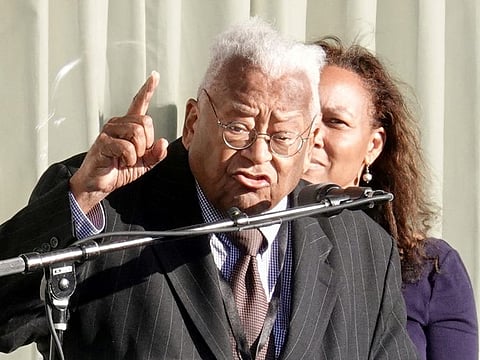James Lawson, US civil rights leader who championed nonviolence, dies at 95
Lawson died of cardiac arrest en route to a hospital in Los Angeles

James Lawson, a prominent civil rights leader whose advocacy of nonviolent protest influenced Martin Luther King Jr. and helped shape the 1960s movement to outlaw discrimination in the US, died at 95 on Sunday, his family said.
Lawson, who King once described as "the leading theorist and strategist of nonviolence in the world," died of cardiac arrest en route to a hospital in Los Angeles, according to the Washington Post, which cited his son.
Lawson's family confirmed his death in an email.
In 1952, as a young Methodist minister, Lawson traveled to India, where he was influenced by the work of Mahatma Gandhi, the anti-colonialist activist who championed peaceful resistance to British rule over India.
When Lawson returned to the US, he became a leading advocate of nonviolent protest as a strategy for the emerging US civil rights movement.
In 1960, Lawson led a series of lunch counter sit-ins in Nashville, Tennessee, and was expelled from Vanderbilt University for his involvement.
Lawson later served as a mentor for the Student Nonviolent Coordinating Committee, made up of mostly Black college students participating in nonviolent protests in support of racial integration.
He participated in the Freedom Rides, a series of protests against segregation where Blacks and whites rode buses together through the South in the 1960s.
Lawson also played a key role in the sanitation workers strike in Memphis, Tennessee. It was at Lawson's request that King came to Memphis, where he was assassinated in 1968.
The work of civil rights leaders such as Lawson resulted in the passage of the Civil Rights Act of 1964, which prohibits discrimination on the basis of race, color, religion, sex or national origin.
"As a fellow member of the Student Nonviolent Coordinating Committee, Reverend Lawson was a trusted voice we could lean on in times of tumult and strife," US Representative James Clyburn said in a post on X.
Lawson was born in 1928 and earned degrees from Baldwin-Wallace College in Ohio and Boston University. He was imprisoned for 13 months after refusing to enlist after he was drafted into the US military.
He later served as a pastor at Holman United Methodist Church in Los Angeles from 1974 to 1999.
Lawson was among seven civil rights leaders recognised by Time magazine ahead of the inauguration of Barack Obama, the first Black US president.
Sign up for the Daily Briefing
Get the latest news and updates straight to your inbox



